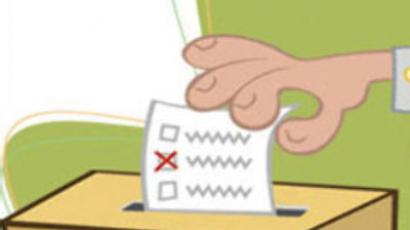Russian rightists form new alliance
Russia’s main right-wing political party, The Union of Right Forces, has joined up with two smaller groups -Civilian Power and Democratic Party of Russia – in order to establish a brand new rightist alliance in the country. RT looks back at the
The party of problems
The Union of Right Forces (a.k.a. Soyuz Pravikh Sil in Russian or SPS) was established in May 2001 on the basis of an election bloc of the same name that has existed since 1999.
SPS was a result of the merging of several smaller liberal parties, including Democratic Choice of Russia and Democratic Russia.
Created by economic gurus, the party quickly earned a reputation as the most market-economy- and reform-oriented in Russia. But during its nine-year history it was constantly embroiled in problems, which prevented it from fulfilling the potential it seemed to have in the early days.
Despite having the backing of former Prime-Ministers Yegor Gaidar, Sergey Kirienko, former Deputy Prime-Minister Boris Nemtsov, former Finance Minister Anatoly Chubais, Samara region’s Governor Konstantin Titov and one of the best known liberal politicians of Russia Irina Hakamada, it never lived up to the results of the 1999 Parliamentary election.
In December 1999, and not yet an established party, the SPS got 8.52% of the votes and created a parliamentary faction consisting of 29 MPs. However, SPS didn’t manage to cross the 5% threshold necessary for parliamentary representation either in 2003 (3.97% of the votes), or in 2007 (0.96%).
Titov was the first head of the SPS, which under him declared support for then Prime-Minister Vladimir Putin, when he started the Second Chechen War. SPS became the second party affiliated with the future President.
In May 2001, when the SPS was registered, Nemtsov became its chair. He started by strongly opposing what he saw as the authoritarian policies of President Putin, claiming that political and media freedoms in Russia had been curtailed.
However, the lack of support for reformer-ministers – Nemtsov, Kirienko and Chubais – who were associated with the shocking state of Russia’s economy in the 1990s, didn’t allow the SPS to get broad support.
Following the negative results of the 2003 election, Nemtsov resigned. In May 2005, former deputy head of Perm Region’s administration, Nikita Belykh, was elected as the new leader of the party.
Sixty thousand members
En route to the next election, Belykh considered the idea of merging with Yabloko, another non-parliamentary party. But he gave up the idea by 2007. The SPS also made sporadic shifts from one election strategy to another, which only added to their woes.
After a trouncing at the polls in the regional election of May 2008, which the SPS attempted to contest in court, Belykh quit and left the party in the hands of his deputy, Leonid Gozman.
In October, the political council of the party voted to dissolve it, with an eye on a possible merger with two other parties – Civilian Power and the Democratic Party of Russia – to form a new liberal-democratic movement the Right Cause Party (Pravoe Delo).
This decision had to be adopted at an extraordinary congress of the party on November 15, which was achieved.
Similar mergers of the Civilian Power and Democratic Party of Russia also went ahead on Saturday, November 15 with a similar outcome. However, the latter two were expected to vote in favour of disbanding, while the bigger SPS had its ex-leader Nemtsov come to Moscow to try and persuade his former comrades not to dissolve.
At the moment it disbanded, the Union of Right Forces had more then 60,000 registered members, 101 of whom are also members of regional parliaments in 43 districts of Russia. The latter number will eventually decline; this is because in 2008 the SPS failed to contest either regional elections or this year’s presidential election.
Russians uninspired by Pravoe Delo
The leader of the Fair Russia party, Federation Council Chairman Sergey Mironov, believes that a consolidation of rightist parties will improve the political system of Russia in general, despite the fact that ideologically they are Fair Russia’s opponents.
One of the two Other Russia party leaders, famous Russian novelist Eduard Limonov, however, is skeptical.
“I wish luck to my allies, but they sincerely believe that by gathering a dozen leaders that have lost their political reputation, they can create a new movement. I think that’s hopeless. You don’t gather beaten generals, you recruit new soldiers,” Limonov said in an interview with Interfax.
Communist Party leader Gennady Zyuganov sees the new union as a ‘rightist merry-go-around made of leftovers from three parties’.
Russian people in general are enthusiastic about getting a new democratic political party. Nineteen per cent of them believe it will get into the State Duma at next election. Moreover some 4% wouldn’t be surprise to see it as the next party in power, according to research by the Russian Public Opinion Research Center.
However, 45% of respondents aren’t optimistic about a party under the name of the ‘Right Cause’: 16% don’t see it in the future State Duma, while 29% hardly expect it to have any success at all.
The statistical uncertainty for this research doesn’t’ exceed 3.4%.
Ruben Zarbabyan, RT













